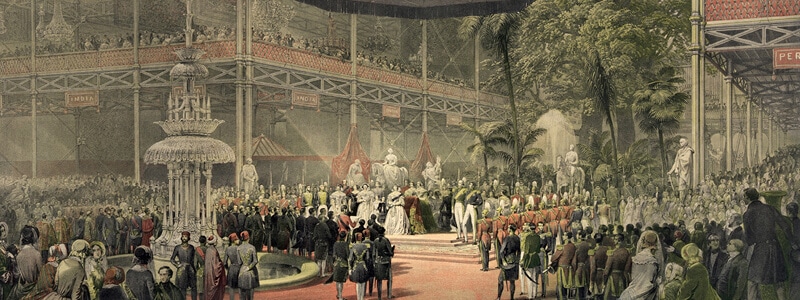
Since early humans gathered their tribes to share hunting tips, we’ve had a penchant for exchanging information at events. Physical events and exhibitions communicate more efficiently than repeatedly explaining things to individuals. Now, in an age where digital sharing is all too easy, the impact of physical events continues to capture our imaginations.
But what single events could lay claim to catapulting humankind forwards? Here are five that have significantly impacted our lives.
The Great Exhibition
No British writer could produce a list of great events without including The Great Exhibition of 1851.
The Great Exhibition was organised by Christmas card inventor Henry Cole and royal squeeze Prince Albert, and held in Hyde Park from May to October 1851. The exhibition is perhaps most famous for the ornate glass building that was built to house it – the Crystal Palace.
Six million people visited, and it produced sufficient profit and enthusiasm to inspire the building of today’s South Kensington museums – the Victoria and Albert, the Science Museum and the Natural History. The exhibition itself inspired multiple areas of human endeavour including engineering, design and art.
Exposition Universelle of 1889
London’s 1851 Great Exhibition was partly inspired by the French Industrial Exhibition of 1844. So, when the 100th anniversary of the storming of the Bastille arrived in 1889 – the French had to go one better with the Exposition Universelle. (Expect more Anglo-Franco rivalry later.)
Perhaps inspired by the Crystal Palace, the organisers constructed a special tower to serve as the entrance arch to the Paris-based world’s fair. Although initially planned to be dismantled after 20 years, that entrance arch/tower still stands today – the Eiffel Tower, designed and built by Gustave Eiffel’s civil engineering company.
But there was one exhibit at the Exposition Universelle that’s had even more impact than the skyline-defining symbol of Paris. Karl Benz, inventor of the motor car, exhibited the Benz Patent-Motorwagen Nr. 3 – the first motor car able to complete a long distance journey. Interest was high, sales rocketed, and the petrol age began in the shadow of the Tour Eiffel.
Field of the Cloth of Gold
In 1520, in a valley subsequently called the Val d’Or (‘Valley of gold’), two kings – one English, one French – held a joint event: the Field of the Cloth of Gold. It was a lavish celebration to outshine all others, and the wealth on display, from clothes through tent material to gold-decorated armour, gave the event its name.
Arranged to strengthen a non-aggression pact signed by Henry VIII and Francis I two years prior, there was only one rule – don’t let the two kings fight. This rule was broken when Henry challenged Francis to a wrestling match… and lost.
Did Henry’s embarrassing defeat affect our world? Well, you could argue that Henry’s loss to a catholic king influenced his decision to break from the catholic church. Although unplanned, the outcome of this significant gathering could have led to one of the most significant periods of Western history – the English Reformation.
Menlo Park
American Thomas Edison invented the phonograph in 1877 – the first device capable of recording and replaying sound – but he’s better known for the invention that cartoonists use to signify invention. The light bulb.
Although Edison had also revolutionised telegraph technology, the fastest way to spread word of his electric lamp was public display. His lighting displays at Menlo Park attracted vast crowds, including journalists and financiers who gathered to witness this epoch defining moment.
Le Mans
Known now for endurance sports car racing, the French city of Le Mans was once host to an even more significant event in the history of transportation: flight.
Although the Wright Brothers had performed the first powered flight in 1903, they struggled to attract the investment needed to develop their flying machines. There was interest in America and France, but public flying displays were a prerequisite for funding. Orville Wright crashed in America, but in 1908 at Le Mans, his brother Wilbur carried out flying demonstrations to thousands of amazed onlookers which carved the brothers’ names in stone.
The age of popular flight began at those events.
These five events heralded hugely significant human eras: the height of the Industrial Revolution, the Reformation, motor car, electric light and powered flight. Although inventions and achievements happen in their natural environments, it’s the event that celebrates them and excites audiences, attracting custom, investment and potential for growth.
The age of events began about 40,000 years ago when cave paintings started to appear – and it’s still going strong.
What have we missed? Let us know!
Subscribe and stay up to date
receive essential emails.


